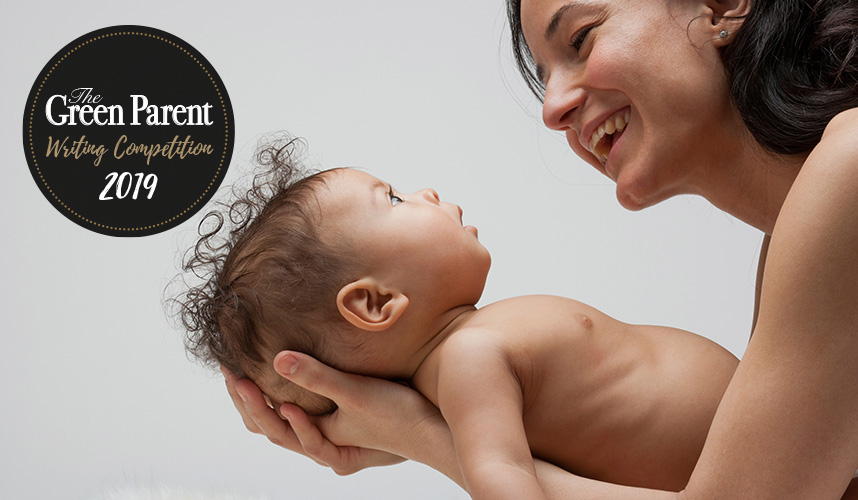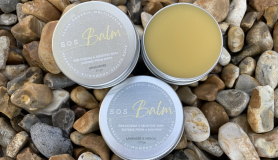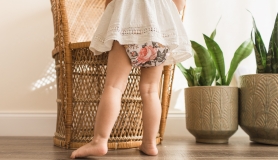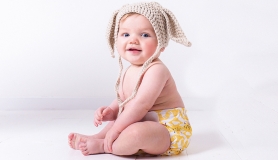It sounded like a disaster waiting to happen when a friend first told me about Elimination Communication (ECing). Could I really have a nappy-free baby? Already having a toddler meant that I had seen my fair share of bodily excretions but I preferred to keep these contained given half a chance! What I went on to learn about this lost skill inspired me to give it a go. I am so very glad that I did.
A friend lent me her book “The Diaper Free Baby” and after reading through it, chatting to another couple that were ECing their son and a bit of Googling I decided that I wanted to try this nappy-free approach with my daughter. I was drawn to the concept of joyful communication with my new baby and that she would be potty-trained early (this is not a given but a strong possibility). I was fed-up with changing dirty nappies after a long bout of toddler diarrhoea with my son. It also appealed to my eco-conscious side as I would be reducing water usage as I would be washing fewer cloth nappies and wipes and there would be fewer disposable nappies going to landfill. It took the pressure off to discover that this wasn’t an all or nothing approach and it was something that I could do part-time.
So what is EC? Elimination Communication is a way of reading your baby’s signs to understand when they need to empty their bowels and taking their nappy off or leaving them nappy free and holding them over a suitable vessel, whether that is a potty, toilet or the ground. The terminology with ECing is a “catch” and a “miss”. If a wee or poo goes in the area that you have designated then that is a “catch”. If it happens to go on the floor, your clothes or anywhere else then that is a “miss”. There are no accidents, there is no potty training in the formal sense and there is no praise (a newborn baby has no idea what you are saying and after a while you stop saying well done to yourself) so by the time they are old enough to understand they just know that wee and poo goes in the potty / toilet and that is a fact of life.
What is Elimination Communication
So what is required on your behalf as the caregiver? There is a requirement to understand when a baby needs to eliminate their waste. . Babies are born with the ability to communicate when they need to “go”. They have a “wee” face and a “poo” face. There is also the “timing” method which means just keeping an eye on the time to work out how regularly they wee and then pre-empting this. There are some easy starting places. Babies wee after they have woken up. That means you have a small window to get them to the toilet and hold them over for them to wee every time they wake from a nap. Newborns also tend to wee and/or poo when they are feeding.
So I approached this new system the same way that I approach everything parenting related, I armed myself with all the knowledge I could find and a desire to succeed. I wanted to win, to have such a deep connection with my daughter that I could just feelwhen she needed to wee. However, as I keep discovering, I never feel like a winner as a mum. When my daughter was born she was put in a cloth nappy (I have the lovely newborn shot with the cute print) and I gave myself a few days to recover before trying to guess when she might wee. I decided to keep using cloth nappies and then just take them off when I thought she needed a wee, rather than go nappy-free straight from the start. The easiest wee to catch is the one after a baby wakes up because this always happens. Being so eager to succeed, as soon as she stirred I was there holding her over the toilet before she had a chance to really open her eyes. After about 10 seconds and nothing had happened, I felt I had failed and missed the chance so put a new nappy on her. Within a few minutes this was wet. This happened a number of times before I finally realised that I didn’t have to run her to the nearest toilet as soon as she opened her eyes. In fact, my husband, who wasn’t on board with my newest crazy scheme showed me how it was done. He would gently pick her up as she woke up and talking quietly to her, he would slowly take her to the bathroom, remove her nappy before holding her over the toilet which she would happily wee in and then looking very pleased with himself, he would pass her over for some milk. After feeling like a failure for the first few days, I finally caught my first wee. A catch! I was filled with a sense of pride and relief. I can do this. I can understand my baby’s needs. It is a special connection knowing when your baby needs to empty their bladder or bowels and I felt that our bond grew even stronger having this extra attention from me.
How I did it
I’ll share a secret with you. I never got the “I need a wee face”. As my daughter started to be awake a bit more during the day, she was out of the sling and I laid her down on the floor with lots of prefold nappies underneath her. So from about 3 months most of the time we were home, she was nappy-free. I spent days watching her closely but in the seconds that I turned to get my drink or pick up my phone she would do a silent wee. Trying to entertain a toddler meant that I didn’t have the capacity to study her as he needed my constant attention. She did a face when she was doing a wee but by then it was too late. So instead, I just watched the clock and tried to guess when she might next need a wee. I could pretty much catch the ones after a nap time so that meant I felt successful three or four times a day. The area that I excelled in was catching poo. I had always managed to catch these since she did a poo face a while before anything got going which gave me enough time to get her to the potty. By the time she was completely nappy-free at 16 months I could count on one hand the number of her dirty nappies I had changed.
There were many times when I was with friends when I doubted my instincts, anxiety got the better of me and I lost track of time and completely missed all wees. One time in a friend’s garden instead of persevering holding her over a potty after a nap, I stopped after about 30 seconds as I felt foolish because she wasn’t doing anything. I sat her on my lap and a minute later felt my legs getting warm and wet as she weed all over my trousers. I had to drive home just wearing a long vest top pulled down over my pants that afternoon. That taught me to listen to my instincts and ignore any strange looks!
I suffered with Post Natal Depression after my daughter which was truly horrible and put me in a dark hole for a long time. It meant that she was put in disposable nappies rather than cloth as I couldn’t get my head round all the washing and my family didn’t think it was important which really pained me. It also meant I wasn’t as diligent as I was at first with the ECing but I kept it up very part-time because it was so important to me and when it went well, it make me feel like I was capable of being connected to my new baby. Out the other side of my mental health battle, during the summer months I did a lot of nappy-free time and tried to identify when she needed a wee as much as possible. By 16 months she was bringing me the potty when she needed a wee since she never picked up the hand sign I had been using since birth and couldn’t yet talk. I thought she was probably ready to go completely nappy-free but was apprehensive to say the least. I got support from the ECing Facebook group and took the plunge one day. I had one pair of training pants so put those on her and just went with it. Less than a month later and she was fully potty trained, able to tell us “wee” enough in advance so we could get her to the toilet; no nappy during car trips or nap time. There were still “misses” over the following months as with potty-training at any age but she is fearlessly independent and determined so had it all under control. And the day after she turned two she decided she had had enough of nappies at night so never put one on again.
The Result
I feel so proud of her and of myself for trusting that we could communicate enough to take care of this basic need and for being able to ditch the nappies for good.
Claire Giles is a full-time mum, home educator, breastfeeding & babywearing peer supporter, massage therapist & reflexologist. She lives in Berkshire with her husband and two children and aims to tread as gently on the Earth as possible. Follow her on Instagram @real.life.parent or blog www.caringforourearth.co.uk







